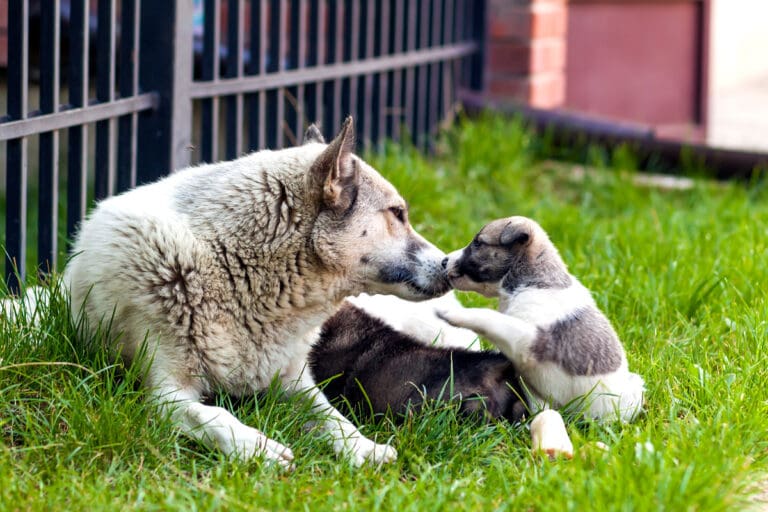Dogs bark for many reasons, one of which is to communicate. However, barking becomes problematic when it affects others, such as neighbors. Learn to identify what causes your dog to bark and 10 ways to calm a barking dog.
10. Identify the Cause of Problematic Barking

Dogs bark for numerous reasons. The most common reason some dogs vocalize is to give a warning in defense of their territory when strangers or animals approach. However, dogs also bark out of boredom, loneliness, frustration, separation anxiety, fear, pain, or discomfort. You must identify the cause before you can determine the cure.
9. Limit Exposure to Stimuli That Provoke Barking

Limit exposure to stimuli that provoke the dog to bark. For example, if your dog barks at people or animals by a certain window, use curtains or put the dog in another room to block the stimulus. For outdoor pets, install a privacy fence. Visual inhibitors may help, but dogs have keen hearing and may still be stimulated by sounds.
8. Address the Barking Issue Immediately

Train your dog not to bark as soon as possible. The longer it continues, the more the habit will become ingrained. Address barking issues the moment they arise. You may also want to use a dog monitor to track your dog’s barking when you’re away. This will help you know what’s going on so that you can deal with it.
7. Use Simple Commands, Keep Your Voice Calm

Training your dog not to bark requires two things: Select a single word to use as the command and be consistent. For example: “Hush.” Make sure everyone sticks to the same word. Secondly, always speak in a low, calm voice. Raising your voice might excite the dog and make it think you are joining in on the barking.
6. Ignore the Barking

This might sound like it’s suddenly the opposite of previous advice. However, if the dog is barking to get your attention – ignore it. In these cases, responding to your dog’s barking will condition it that barking elicits the response it wants from you. Ignore the barking until it stops, then reward your dog for being quiet.
5. Reward Good Behavior

Remember, barking is a communication tool for dogs. They don’t understand that their barking annoys you or others. However, dogs immediately understand rewards. When your pooch barks, calmly issue your one-word command. When the dog ceases its barking, reward it with a treat. It won’t take the dog long to learn to be quiet to get the reward it wants.
4. Remedies for Bored or Anxious Dogs

These two methods don’t require human involvement or presence. For bored dogs that bark, provide a way they can entertain themselves. Dogs enjoy toys. For example, just before leaving for work, give your dog a food-dispensing puzzle toy. For dogs with separation anxiety, leaving the TV or radio on with human voices will approximate sounds dogs are used to hearing.
3. Exercise Is Key

Many dogs bark to release tension and anxiety. Exercise is an effective tool against barking resulting from boredom and frustration. The amount of exercise will depend on the dog’s age and health. The point is to burn off the excess energy that can lead to barking. Some dogs may require several long walks, as well as a game of fetch and other activities.
Read More: 10 Heartwarming Stories About Dogs Saving Humans
2. Hire Someone to Help When You’re Away

Being pack animals, dogs have a strong desire for companionship. If your dog barks when you are away at work, it may help to hire someone to give your dog the companion it craves. Hire a dog sitter or dog walker to spend time with your dog to break up the long, lonely hours.
Read More: The Most High-Maintenance Dog Breeds
1. Get a Vet Checkup

If nothing will stop your dog from excessive barking, take your dog for a veterinary checkup. Ensure there isn’t anything medically wrong with the dog that’s contributing to the barking. This is especially true if your dog suddenly begins barking a lot. Barking may be the only way a dog suffering pain or discomfort can communicate the problem.
Read More: 10 Signs Your Dog Is Unhappy






